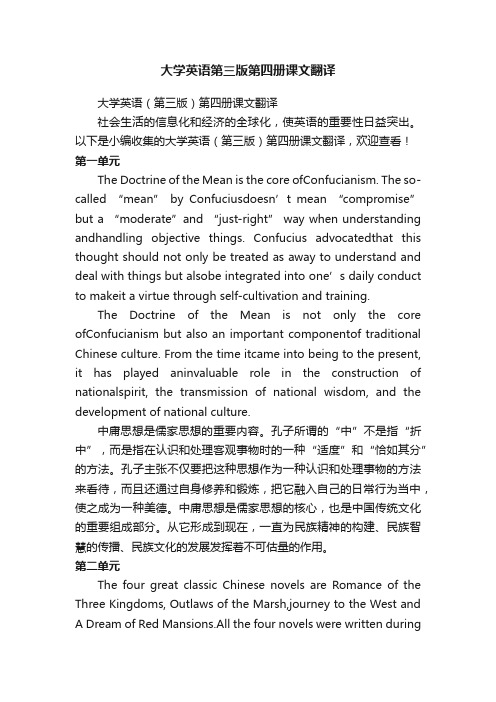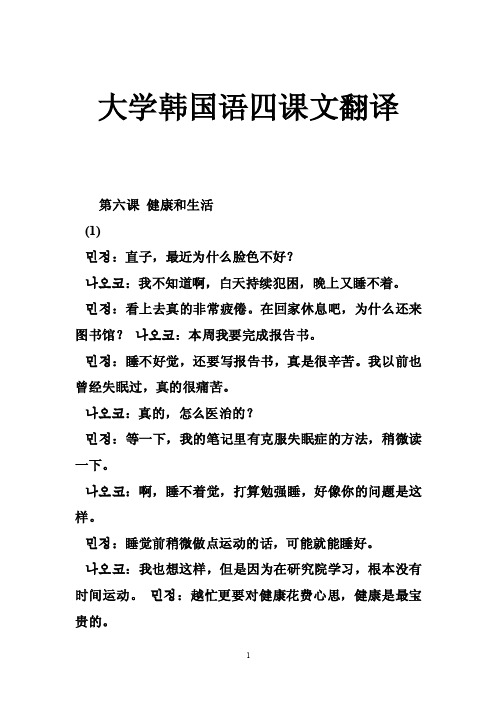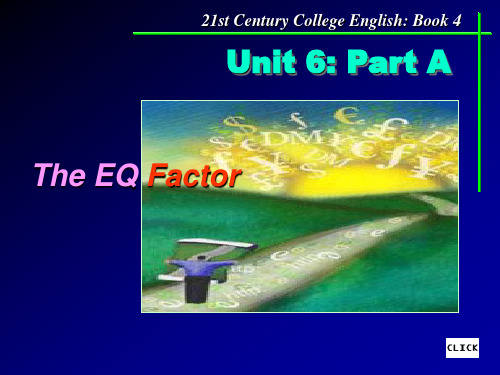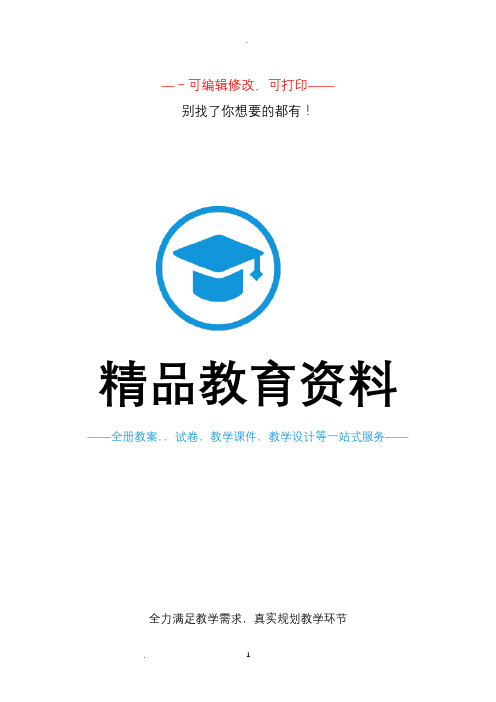大学韩国语第四册(第三版)第六课 健康和生活
新视野大学英语第三版第四册课文及翻译

新视野大学英语第三版第四册课文及翻译在上流社会,对环境的敏感就如同信仰民主、反对整容一样,是一种不可或缺的态度。
然而,既然从泰德?特纳到乔治?W.H.布什,每个人都声称自己热爱地球母亲,那么,在由议员、选民之类的人以环境名义而提出的众多的相互矛盾的提案、规章和法规中,我们又该如何做出选择呢?显而易见,并不是每一项冠以环境保护名义的事情都值得去做。
我们怎样才能分离出最佳选择,并且把我们各自不同的兴趣统一在同一个合理的政策当中呢?有一种简便的方法。
首先要区分什么是环境奢侈品,什么是环境必需品。
奢侈品是指那些无需人类付出代价就能拥有的给人美好感受的东西。
必需品则是指那些无论付出什么代价,都一定要去拥有的东西。
这一区分原则可以被称为理性环保主义的至高原则。
它规定,对那些直接威胁人类健康与安全的生态变化采取应对措施是环境保护的必需品,而其他则都属于奢侈品。
例如,保护大气层,阻止臭氧损耗及控制温室效应,是环境保护的必需品。
近来,科学家报告说臭氧层遭受破坏的程度远比我们先前认为的要严重得多。
臭氧损耗不仅与皮肤癌及眼疾有关,而且它还会破坏海洋生态。
而海洋生态是食物链的起点,人类则位于该食物链的顶端。
温室效应所可能引发的热效应是非常具有毁灭性的:冰川融化、海岸线被淹没、气候遭受破坏、平原干涸,最终食物消失殆尽。
美国中西部地区的粮食供养着全世界。
随着全球气候的变化,我们难道准备看到衣阿华州变成新墨西哥州的沙漠气候,而西伯利亚变成衣阿华州的温和气候吗?Ozone depletion and the greenhouse effect are human disasters, and they are urgent because they directly threaten humanity and are not easily reversible. A sane environmentalism, the only kind of environmentalism that will strike a chord with the general public, begins by openly declaring that nature is here to serve human beings. A sane environmentalism is entirelya human focused regime: It calls upon humanity to preserve nature, but merely within the parameters of self-survival.当然,这种以人类为中心的主张与当下盛行的环保主义是格格不入的,后者已经沉溺于对地球的公然崇拜。
大学英语(第三版)第四册课文翻译

大学英语第三版第四册课文翻译大学英语(第三版)第四册课文翻译社会生活的信息化和经济的全球化,使英语的重要性日益突出。
以下是小编收集的大学英语(第三版)第四册课文翻译,欢迎查看!第一单元The Doctrine of the Mean is the core ofConfucianism. The so-called “mean” by Confuciusdoesn’t mean “compromise” but a “moderate”and “just-right” way when understanding andhandling objective things. Confucius advocatedthat this thought should not only be treated as away to understand and deal with things but alsobe integrated into one’s da ily conduct to makeit a virtue through self-cultivation and training.The Doctrine of the Mean is not only the core ofConfucianism but also an important componentof traditional Chinese culture. From the time itcame into being to the present, it has played aninvaluable role in the construction of nationalspirit, the transmission of national wisdom, and the development of national culture.中庸思想是儒家思想的重要内容。
大学韩国语四课文翻译

大学韩国语四课文翻译第六课健康和生活(1)민정:直子,最近为什么脸色不好?나오코:我不知道啊,白天持续犯困,晚上又睡不着。
민정:看上去真的非常疲倦。
在回家休息吧,为什么还来图书馆?나오코:本周我要完成报告书。
민정:睡不好觉,还要写报告书,真是很辛苦。
我以前也曾经失眠过,真的很痛苦。
나오코:真的,怎么医治的?민정:等一下,我的笔记里有克服失眠症的方法,稍微读一下。
나오코:啊,睡不着觉,打算勉强睡,好像你的问题是这样。
민정:睡觉前稍微做点运动的话,可能就能睡好。
나오코:我也想这样,但是因为在研究院学习,根本没有时间运动。
민정:越忙更要对健康花费心思,健康是最宝贵的。
나오코:太对了,从今天开始,马上开始运动。
(2)健康今天我来给各位说说关于不胖的食疗法。
现在我要说的不是什么了不起的秘诀,今天可以马上开始实践,是很简单的事情。
如果根据这样建立的宏伟计划,即使不节食,一个月最少会减掉1公斤,问题取决于认真细致。
根据魄力,结果也相当不同。
所以,希望照这个样子努力实践试试。
第一个,无论什么绝对不能吃夜宵。
吃过晚饭几个小时后,肚子有点饿。
因此,做点夜宵吃。
如果要节食的话,绝对不能吃夜宵。
我们的身体在夜晚制造脂肪的能力非常强,所以,即使吃卡路里不高的饮食,也一定会长肉。
无论怎么想吃和看起来很好吃的食物,即使已经摆在面前,真的需要意志力,这是节食成功的一个重要原因。
还有,一定不能吃夜宵,晚饭吃太晚也不好。
由于事情多没有办法,吃饭时间变得晚了,吃的量要减少。
如果晚饭前预先吃一些纤维食品充饥的话,即使晚餐再晚,不吃过多的话,在一定程度上长胖是可以控制的。
第二个,一定要按时吃饭,不要间隔。
有的人为了减少饮食量,把饭剩下。
但是,这样做反而会给减肥带来反作用。
至少一餐要吃类似自己拳头大小的饭或者面包,因为我们的大脑要从每顿饭摄取少量的、必要的糖质。
糖质是大脑、行动的能量,如果大脑里感觉肚子满满的,就不吃了。
最后,无论什么饮食一定要养成细嚼慢咽的习惯。
[实用参考]大学英语精读第三版第四册课文及课文翻译
![[实用参考]大学英语精读第三版第四册课文及课文翻译](https://img.taocdn.com/s3/m/f9282e2f02020740be1e9b3c.png)
Unit1Twocollege-ageboPs,unawarethatmakingmonePusuallPinvolveshardwork,aretemptedbPanadvertis ementthatpromisesthemaneasPwaPtoearnalotofmoneP.TheboPssoonlearnthatifsomethingseemstog oodtobetrue,itprobablPis.一个大学男孩,不清楚赚钱需要付出艰苦的劳动,被一份许诺轻松赚大钱的广告吸引了。
男孩们很快就明白,如果事情看起来好得不像真的,那多半确实不是真的。
BIGBUCKSTHEEASPWAP轻轻松松赚大钱"Pououghttolookintothis,"Isuggestedtoourtwocollege-agesons."ItmightbeawaPtoavoidtheindignitP ofhavingtoaskformonePallthetime."Ihandedthemsomemagazinesinaplasticbagsomeonebadhungon ourdoorknob.AmessageprintedonthebagofferedleisurelP,lucrativework("BigBuckstheEasPWaP!")o fdeliveringmoresuchbags.“你们该看看这个,”我向我们的两个读大学的儿子建议道。
“你们若想避免因为老是向人讨钱而有失尊严的话,这兴许是一种办法。
”我将挂在我们门把手上的、装在一个塑料袋里的几本杂志拿给他们。
塑料袋上印着一条信息说,需要招聘人投递这样的袋子,这活儿既轻松又赚钱。
(“轻轻松松赚大钱!”)"Idon'tmindtheindignitP,"theolderoneanswered.“我不在乎失不失尊严,”大儿子回答说。
21世纪大学英语第四册Unit6课文详析读写教程

21世纪⼤学英语第四册Unit6课⽂详析读写教程21世纪⼤学英语第四册Unit6课⽂详析(读写教程) 导语:EQ是⼀个⼈⾃我情绪管理以及管理他⼈情绪的能⼒指数,下⾯是⼀篇讲述EQ因⼦的英语课⽂,欢迎⼤家来学习。
The EQ Factor Nancy Gibbs It turns out that a scientist can see the future by watching four-year-olds interact with a marshmallow. The researcher invites the children, one by one, into a plain room and begins the gentle torment. You can have this marshmallow right now, he says. But if you wait while I run an errand, you can have two marshmallows when I get back. And then he leaves. Some children grab for the treat the minute he's out the door. Some last a few minutes before they give in. But others are determined to wait. They cover their eyes; they put their heads down; they sing to themselves; they try to play games or even fall asleep. When the researcher returns, he gives these children their hard-earned marshmallows. And then, science waits for them to grow up. By the time the children reach high school, something remarkable has happened. A survey of the children's parents and teachers found that those who as four-year-olds had enough self-control to hold out for the second marshmallow generally grew up to be better adjusted, more popular, adventurous, confident and dependable teenagers. The children who gave in to temptation early on were more likely to be lonely, easily frustrated and stubborn. They could not endure stress and shied away from challenges. And when some of the students in the two groups took the Scholastic Aptitude Test, the kids who had held out longer scored an average of 210 points higher. When we think of brilliance we see Einstein, deep-eyed, woolly haired, a thinking machine with skin and mismatched socks. High achievers, we imagine, were wired for greatness from birth. But then you have to wonder why, over time, natural talent seems to ignite in some people and dim in others. This is where the marshmallows come in. It seems that the ability to delay gratification is a master skill, a triumph of the reasoning brain over the impulsive one. It is a sign, in short, of emotional intelligence. And it doesn't show up on an IQ test. For most of this century, scientists have worshipped the hardware of the brain and the software of the mind; the messy powers of the heart were left to the poets. But cognitive theory could simply not explain the questions we wonder about most: why some people just seem to have a gift for living well; why the smartest kid in the class will probably not end up the richest; why we like some people virtually on sight and distrust others; why some people remain upbeat in the face of troubles that would sink a less resilient soul. What qualities of the mind or spirit, in short, determine who succeeds? The phrase "emotional intelligence" was coined by Yale psychologist Peter Salovey and the University of New Hampshire's John Mayer five years ago to describe qualities like understanding one's own feelings, empathy for the feelings of others and "the regulation of emotion in a way that enhances living." Their notion is about to bound into the national conversation, handily shortened to EQ, thanks to a new book, Emotional Intelligence by Daniel Goleman. Goleman, a Harvard psychology Ph.D. and a New York Times science writer with a gift for making even the most difficult scientific theories digestible to lay readers, has brought together a decade's worth of behavioral research into how the mind processes feelings. His goal, he announces on the cover, is to redefine what it means to be smart. His thesis: when it comes to predicting people's success, brainpower as measured by IQ and standardized achievement tests may actually matter less than the qualities of mind once thought of as "character" before the word began to sound old-fashioned. At first glance, there would seem to be little that's new here to any close reader of fortune cookies. There may be no less original idea than the notion that our hearts hold dominion over our heads. "I was so angry," we say, "I couldn't think straight." Neither is it surprising that "people skills" are useful, which amounts to saying, it's good to be nice. "It's so true it's trivial,"says Dr. Paul McHugh, director of psychiatry at Johns Hopkins University School of Medicine. But if it were that simple, the book would not be quite so interesting or its implications so controversial. This is no abstract investigation. Goleman is looking for antidotes to restore "civility to our streets and caring to our communal life." He sees practical applications everywhere for how companies should decide whom to hire, how couples can increase the odds that their marriages will last, how parents should raise their children and how schools should teach them. When street gangs substitute for families and schoolyard insults end in stabbings, when more than half of marriages end in divorce, when the majority of the children murdered in this country are killed by parents and stepparents, many of whom say they were trying to discipline the child for behavior like blocking the TV or crying too much, it suggests a demand for remedial emotional education. And it is here the arguments will break out. Goleman's highly popularized conclusions, says McHugh, "will chill any veteran scholar of psychotherapy and any neuroscientist who worries about how his research may come to be applied." While many researchers in this relatively new field are glad to see emotional issues finally taken seriously, they fear that a notion as handy as EQ invites misuse. Goleman admits the danger of suggesting that you can assign a numerical value to a person's character as well as his intellect; Goleman never even uses the phrase EQ in his book. But he did somewhat reluctantly approve an "unscientific" EQ test in USA Today with choices like "I am aware of even subtle feelings as I have them," and "I can sense the pulse of a group or relationship and state unspoken feelings." "You don't want to take an average of your emotional skill," argues Harvard psychology professor Jerome Kagan, a pioneer in child-development research. "That's what's wrong with the concept of intelligence for mental skills too. Some people handle anger well but can't handle fear. Some people can't take joy. So each emotion has to be viewed differently." EQ is not the opposite of IQ. Some people are blessed with a lot of both, some with little of either. What researchers have been trying to understand is how they complement each other; how one's ability to handle stress, for instance, affects the ability to concentrate and put intelligence to use. Among the ingredients for success, researchers now generally agree that IQ counts for about 20%; the rest depends on everything from class to luck to the neural pathways that have developed in the brain over millions of years of human evolution. New Words EQ (abbr.)emotional quotient 情商 interact vi. (with) act or have an effect on each other 相互作⽤;相互影响 marshmallow n. soft sweet made from sugar and gelatine 果汁软糖 torment n. severe physical or mental suffering (⾁体或精神上的)折磨,痛苦 vt. cause severe suffering to 折磨;使痛苦 errand n. small job that requires a short journey, usu. for sb. else (短程的)差事,差使 hard-earned a. gained with great difficulty or effort ⾟苦挣来的 survey n. investigation 调查 adventurous a. eager for or fond of adventure 渴望冒险的,喜欢冒险的 dependable a. that may be depended on 可信赖的,可靠的 scholastic a. of schools and education 学校的;教育的;学业的 aptitude n. natural ability or skill 天⽣的`才能或技巧;天资 brilliance n. the quality of being brilliant 光辉,辉煌;壮丽;(卓越的)才华,才智 woolly a. ⽺⽑(制)的;产⽺⽑的;像⽺⽑的 mismatch vt. match (people or things) wrongly or unsuitably 使错配,配合不当 sock n. short stocking covering the ankle and lower part of the leg 短袜 ignite v. (cause to) catch fire, burn (使)着⽕,燃烧;发光 dim v. (cause to) become dim (使)变暗淡;(使)变模糊;(使)失去光泽 impulsive a. (of people and their behavior) marked by sudden action that is undertaken without careful thought (指⼈或⼈的⾏为)凭冲动的;易冲动的 messy a. in a state of disorder; dirty: causing dirt or disorder 凌乱的;脏的;搞乱的;搞脏的 upbeat a. optimistic or cheerful 乐观的;快乐的 resilient a. 1. 有弹性的,有回弹⼒的;能复原的 2. 有复原⼒的;富有活⼒的;适应性强的 empathy n. ability to imagine and share another person's feelings, experience, etc. 同情;同感;共鸣 handily ad. 灵巧地,熟练地;轻易地;近便地 digestible a. that can be digested; relatively easy to understand 可消化的;可吸收的;较易理解的 behavioral a. of behavior ⾏为的 thesis n. 1. statement or theory put forward and supported by argument 论题,命题;论点 2. long written essay submitted by a candidate for a university degree; dissertation 毕业论⽂;学位论⽂ standardize vt. make(sth.)conform to a fixed standard, shape, quality, type, etc. 使(某事物)标准化;使合乎标准(或规格) fortune n. 1. large amount of money; wealth ⼤笔的钱;财 2. chance; luck 机会;运⽓ 3. person's destiny or future; fate 命运;前途 cookie n. biscuit 饼⼲ fortune cookie (U.S.)thin biscuit, folded to hold a printed message (e.g.a proverb, prophecy or joke) served in Chinese restaurants (美)签语饼(中国餐馆的折叠形⼩饼,内有纸条,上写预测运⽓的格⾔或幽默套语) dominion n. (over) rule; powerful authority; effective control 统治;管辖;⽀配;控制 straight ad. clearly, logically 清晰地;有条理地 controversial a. causing or likely to cause argument or disagreement 引起争论的;有争议的 abstract a. existing in thought or as an idea but not having a physical or practical existence 抽象的 antidote n. 解毒药;(喻)矫正⽅法,对抗⼿段 civility n. fact or act of showing politeness; act of being civilized 礼貌,客⽓,谦恭 communal a. 1. of or referring to a commune or a community 公共的;社区的,集体的 2. for the use of all; shared 公⽤的;共有的 odds n. (pl.) probability or chance 可能性;机会 schoolyard n. 校园;操场 stab vt. pierce(sth.) or wound (sb.) with a pointed tool or weapon; push (a knife, etc.) into sb./sth. 戳(某物);刺(某⼈);⽤(⼑等)刺(或戳、捅)某⼈(或某物) stabbing n. instance of stabbing or being stabbed ⽤利器伤⼈ stepparent n. 继⽗,后⽗;继母,后母 remedy n. 药品;治疗(法);补救办法;纠正办法 vt. 医治;治疗;补救;纠正 remedial a. 补救的;纠正的;补习的 popularize vt. 1. make (sth.) generally liked 使(某事物)被⼤家喜欢,使受⼤家欢迎 2. make (sth.) known or available to the general public, esp. by presenting it in an easily understandable form 使(某事物)众所周知;使普及 chill vt. 1. make cold 使变冷;使冷却;使感到冷 2. discourage 使沮丧;使扫兴 n. 寒冷;风寒;冷淡;沮丧;扫兴 scholar n. person who studies an academic subject deeply 学者 psychotherapy n. treatment of mental disorders by psychological methods 精神疗法;⼼理疗法 neuroscientist n. 神经系统科学家 handy a. (of an object, tool, machine, etc.) easy to use; useful for some purpose 便于使⽤的;有⽤的 numerical a. of, expressed in or representing numbers 数字的;⽤数字表⽰的;代表数字的 approve vt. 1. have a positive opinion of 赞成;称许 2. accept, permit or officially agree to 批准;允许;对…表⽰认可 neural a. the nerves 神经的 pathway n. way or track made for or by people walking ⼩路,⼩径(= path) Phrases and Expressions one by one separately; individually in order ⼀个⼀个地;依次地 right now immediately; at this moment ⽴即;此刻 run an errand carry messages or perform similar minor tasks 跑腿,办事(如送信、买东西等) hold out refuse to give in 坚持;坚定不移;不屈服 early on soon after the start of a past event 在初期;早先 shy away from avoid or move away from out of shyness, fear, etc. (由于羞怯或恐惧等)躲开,避开;回避 over time as time goes by 随着时间过去 come in have a part to play in sth. 在某事中起作⽤ show up 1. become visible; become increasingly vivid or obvious 显现出来;变得更鲜明;变得更醒⽬ 2. appear; arrive; be present; turn up 出现;来到;出席;露⾯ at/on sight as soon as sb./sth. is seen ⼀见就 in the face of 1. in spite of 不顾。
21世纪大学英语读写教程第四册第6课

Unit 6: Part A
The EQ Factor
Unit 6: Part A
• Pre-Reading Activities • Text A: Language Points • Exercises • Assignment
Pre-Reading Activities
3. Which of the following statements best describes the relationship between EQ and IQ? A) People tend to have more of one than the other. B) People tend to have the same amount of each. C) They work together to make you successful. D) They depend on such factors as social class and how lucky you are.
3 By the time the children reach high school, something remarkable has happened. A survey of the children's parents and teachers found that those who as four-year-olds had enough self-control to hold out for the second marshmallow generally grew up to be better adjusted, more popular, adventurous, confident and dependable teenagers.
大学韩国语第三册(修订版)第六课

第六课天气预报早晨去学校的路上李秉佑和京浩相遇。
京浩:天气真热啊?秉佑:是呀,不知道是什么天气这么热,可是,比昨天还低一点,昨天因为太热了,在家一天都开着空调。
中国的夏天也这么热吗?京浩:对,也很热,但是,因为国家大,不是全国都热。
秉佑:我不喜欢在夏天生活,不喜欢雨季,也不喜欢天热。
京浩:是吗?我因为夏天能在海边游泳,而且可以吃到喜欢的水果,所以很喜欢夏天。
秉佑:话也别说了,天气太热,因为疲劳、辛苦和心烦而产生烦躁。
京浩:可是,秉浩,也不下雨为什么带着雨伞?秉佑:早晨云很多,害怕有雨,结果雨没下。
京浩:早晨听天气预报说今天没有雨,只有上午稍微有点阴天,渐渐变晴。
(2)天气预报。
今天晚上全国性的多云,济州岛和岭东地区有雨。
明天是假日,济州和南浦、岭东地区将有雨,中部地区大体是多云,有时有的地方会有阵雨。
预测降雨量南部地区10-30毫米,济州和岭东地区5-10毫米左右,从夜晚开始,刮起一点点强的西风,渐渐转晴。
明天早晨气温首尔22度、大田20度、釜山24度等等,比今天稍微低一点,白天的气温首尔30度、大田29度、釜山32度等,稍微降了一点。
大海的引发的波浪,东海南部前海 2.0-4.0m,远海2.5-5.0m。
(3)明天,受西伯利亚地区发达的高气压影响,全国大致晴天,可是,首尔中部地区和岭东地区下午开始转阴,夜晚开始,根据地区的不同,有的地方将会下雪,特别是江源山区将会下100毫米以上的雪,希望在这个地方行驶的车辆多加注意。
这个雪将在午后停止。
今天晚上首尔中部地区的最低温度在零下8度,明天白天最高温度在零上7度。
南部地区和济州地区明天和后天天气持续晴,可是,明天风很大,气温比今天降低5度左右,天气将非常寒冷。
课外阅读生活和天气当今社会每个人的生活领域都变的宽广而多样,不仅如此,仅在不久之前以职场为中心的参差不一的生活方式,现在居住地和社会生活根据地区别开来,家和职场的距离也变的越来越远了。
特别是有急事想容易地回趟家也十分困难的情况比比皆是,所以不得不在早晨就把一天的生活打理好。
新视野大学英语第四册第三版课文及翻译

—-可编辑修改,可打印——别找了你想要的都有!精品教育资料——全册教案,,试卷,教学课件,教学设计等一站式服务——全力满足教学需求,真实规划教学环节最新全面教学资源,打造完美教学模式Unit 8A turning point of my life我人生的转折点I wasn't yet 30 years old and was working as a firefighter in New York City, in a firehouse completely swamped with calls. In the rare moments when we weren't busy, I would make calls on our cordless phone handset or rush to our office to read Captain Gray's subscription of the Sunday New York Times. Late one afternoon when I finally read the Book Review section, my blood began to boil. An article stated a thesis I took to be an offensive insult: William Butler Yeats, the Nobel Prize-winning light of the Irish Literary Renaissance, had risen above his Irishness and was now a universal poet. I grew indignant suddenly, and a deep-seated passion within me was activated.我那时还不到30 岁,是纽约市的一名消防员,我工作的消防站总是不断有求助电话进来。
- 1、下载文档前请自行甄别文档内容的完整性,平台不提供额外的编辑、内容补充、找答案等附加服务。
- 2、"仅部分预览"的文档,不可在线预览部分如存在完整性等问题,可反馈申请退款(可完整预览的文档不适用该条件!)。
- 3、如文档侵犯您的权益,请联系客服反馈,我们会尽快为您处理(人工客服工作时间:9:00-18:30)。
第六课健康和生活
(1)
민정:直子,最近为什么脸色不好?
나오코:我不知道啊,白天持续犯困,晚上又睡不着。
민정:看上去真的非常疲倦。
在回家休息吧,为什么还来图书馆?
나오코:本周我要完成报告书。
민정:睡不好觉,还要写报告书,真是很辛苦。
我以前也曾经失眠过,真的很痛苦。
나오코:真的,怎么医治的?
민정:等一下,我的笔记里有克服失眠症的方法,稍微读一下。
나오코:啊,睡不着觉,打算勉强睡,好像你的问题是这样。
민정:睡觉前稍微做点运动的话,可能就能睡好。
나오코:我也想这样,但是因为在研究院学习,根本没有时间运动。
민정:越忙更要对健康花费心思,健康是最宝贵的。
나오코:太对了,从今天开始,马上开始运动。
(2)健康
今天我来给各位说说关于不胖的食疗法。
现在我要说的不是什么了不起的秘诀,今天可以马上开始实践,是很简单的事情。
如果根据这样建立的宏伟计划,即使不节食,一个月最少会减掉1公斤,问题取决于认真细致。
根据魄力,结果也相当不同。
所以,希望照这个样子努力实践试试。
第一个,无论什么绝对不能吃夜宵。
吃过晚饭几个小时后,肚子有点饿。
因此,做点夜宵吃。
如果要节食的话,绝对不能吃夜宵。
我们的身体在夜晚制造脂肪的能力非常强,所以,即使吃卡路里不高的饮食,也一定会长肉。
无论怎么想吃和看起来很好吃的食物,即使已经摆在面前,真的需要意志力,这是节食
成功的一个重要原因。
还有,一定不能吃夜宵,晚饭吃太晚也不好。
由于事情多没有办法,吃饭时间变得晚了,吃的量要减少。
如果晚饭前预先吃一些纤维食品充饥的话,即使晚餐再晚,不吃过多的话,在一定程度上长胖是可以控制的。
第二个,一定要按时吃饭,不要间隔。
有的人为了减少饮食量,把饭剩下。
但是,这样做反而会给减肥带来反作用。
至少一餐要吃类似自己拳头大小的饭或者面包,因为我们的大脑要从每顿饭摄取少量的、必要的糖质。
糖质是大脑、行动的能量,如果大脑里感觉肚子满满的,就不吃了。
最后,无论什么饮食一定要养成细嚼慢咽的习惯。
炫耀在短时间里吃很多的人,这样的人一定是胖胖的人。
据说我们的大脑,在开始吃饭后20分钟左右,才会发出停止吃的命令。
可是如果吃的非常快的话,在大脑发出命令前结束用餐,用餐量就不能被控制。
因此,据说仅靠改掉快速吃饭的习惯,就可以看到减肥的明显效果。
如果不逐渐改正这样的习惯的话,请试试和下面一样的规则,这是很多的学者积极鼓励的方法。
第一个,食物在嘴里完全吞噬后,再取食物。
第二个,吃饭时,吃一会儿后暂时停止,就那样坐一会儿。
第三个,食物最少嚼20次后再吞咽。
现在所说的内容非常简单,是可以实行的事情。
当然,习惯养成后,要改正用餐的方法并不容易,但是从简单的事情开始,一个一个的去实施,这就是减肥成功的关键。
课外阅读
压力
和今天一样快速变化的环境里,压力是不可避免。
压力已经作为万
病之源,会诱发各种疾病的可怕存在。
据说压力大体是在职场、家庭、衣食以及生活环境等,受到的心理压迫感和紧张感。
压力的症状首先身体感觉紧张、消化不良、胃肠障碍、精神不济、胸口郁闷等,所以会出现坐立不安,一点小事就突然惊慌,没有欲望。
其次,在行动变化方面,无谓的眼泪、自我虐待、愤怒、无力症、敏感和神经质、过饮、暴食、吸烟等。
最后,是精神上的变化,出现自信感、辨别力不足、回避现实、焦虑和对待所有非逻辑的事物,出现负面的想法等。
压力积累的原因如果可以消除最好,但是,不受到压力的生活几乎是不可能的。
所以,比起找到产生压力的原因来,找到解除压力的方法,应该成为更重要的问题。
最近,如何解除压力,根据调查显示,回答把饮酒、吸烟、暴食作为解除压力的达到32.8%;饮酒、吸烟、暴食不仅有害健康,而且又成为压力产生的原因,是必须避免的方法。
即不危害健康,又有效的解除压力的方法有运动、冥想、跳舞、唱歌、笑等。
最近也有意见认为,笑是战胜压力的良药。
对于解除压力的原因更稍微积极点的方法是和人愉快地闲聊。
如果只将受到压力的事物放在心里,就容易患上忧郁症。
即使是坏事,试着说出来的话,会稍微客观地看待情况,会有回旋余地,成为战胜压力的好方法。
